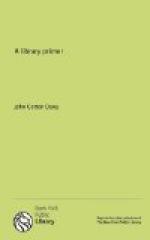Whitaker’s directory of titled persons for the year 1898; a companion to his Almanac. D. Whitaker, paper, 2s. 6d.
3. Who’s who? annual; autobiographies of the leading men and women of the day; complete peerage, etc. 1899. D. Black, cl. 3s. 6d.
1. World almanac and encyclopaedia. 1898. D. New York World, pa. 25 cents.
2. Young, R. Analytical concordance to the Bible, n.d. Ed. 6. Q. Religious tract society, cl. 24s., mor. 30s.
CHAPTER XIII
Reference work—–Helping the inexperienced inquirer—Periodicals
Reference work in libraries large and small has for its first rule: Meet the inquirer more than half way. To the stranger a library is often an oppressive place, an awesome place—in his imagination. He comes in shyly; everyone appears busy, his question suddenly seems to him trivial; he won’t trouble these wise and busy people with it—and goes out.
A good second rule is: Learn at once just exactly what the inquirer wishes to know. This is not always easy. Tact and a little patience will generally effect it.
A good third rule is: Whenever possible show the inquirer how the answer is found, so that he may next time in some measure help himself. It is surprising how many, especially of the younger people in a community, can be taught within one year, on their occasional visits, to make the proper use of at least a few reference books.
Another rule of very general application is: Go first to a dictionary. In many cases a question answers itself, or betrays where its answer may best be found, if it is once plainly stated. And nothing is better than reference to a few words in a dictionary for the clear statement of a question. The larger dictionaries, moreover, and notably the Century, will answer many more inquiries than even great readers often suppose.
Many questions come up again and again. Of these, and of the references which answered them, notes should be kept on cards for future use. In fact it is well to keep an index in this way of the references looked up for all the more important inquiries.
The following excellent advice is from an article on The use of periodicals in reference work, by Frederick Winthrop Faxon, in Public Libraries for June, 1898:
“In all reference work periodicals play a large part. They may be roughly divided into two great classes, the technical and the popular. The former are indispensable to the scholar, or the expert, and in the rapid advancement of science are the only real sources of information. Text-books or treatises are out of date before published; therefore for a correct present view, or a complete history of the development of any science, the technical reviews and society transactions must be consulted. These will be the principal part of a scientific library, and should be in the large public and college libraries in order to cover advanced study.




